Peter MALONE
Saturday, 18 September 2021 19:55
Change of Heart
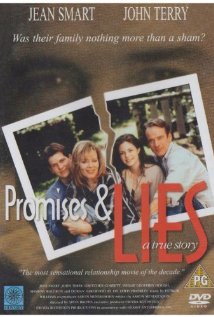
Published in Movie Reviews
Published in
Movie Reviews
Tagged under
Saturday, 18 September 2021 19:55
Grissom Gang, The
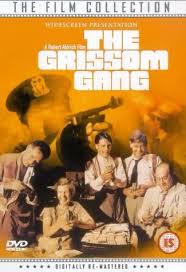
THE GRISSOM GANG
US, 1971, 128 minutes, Colour,
Kim Darby, Scott Wilson, Tony Musante, Robert Lansing, Connie Stevens.
Directed by Robert Aldrich.
The Grissom Gang was given almost non-release. Director Robert Aldrich's attempt to re-create and probe mid western gangsterism of the '30's is a partially interesting film. Over two hours long, it is patchy in characterisation, strong in expected melodrama. But it has its moments as psychopathic killer Slim Grissom (frequently over-played by Scott Wilson) is changed and partly humanised by his love for kidnapped heiress Barbara Blandish (Kim Darby). Period re-creation is good and the two final shootouts alarmingly well done. These gangs are now history and films like this make one wonder about their lasting impact on modern American society and attitudes. For those interested in this genre.
1. Does this seem an original kind of film or does it seem derivative of so many of the '30's Depression gangster films? Why? Even if it is derivative, does this detract from the success of the film?
2. How important was the re-creation of the 130's period for the film? The music, Rudy Vallee's singing, the cars, clothes and styles, rooms' and buildings' decor? Did this add to the impact of this film?
3. The film is very violent. Does the film exploit its style and violence for sensational box-office? Or is it an accurate enough representation of the violence of the times? What does the film say of violence and the American tradition? The effect of the Depression and people in need turning petty criminal and exploiting violence? Is this a message of the film or part of its background?
4. How central was Barbara Blandish for the film? Her place in society as presented at the opening of the film? Her wealth, her style, her snobbery, her fighting with her boyfriend? And then in being captured by petty criminals? What impact did this have on the audience? Identifying with Barbara and her imprisonment and lack of freedom?
5. What did the film show of petty criminals trying to be better than they were, suddenly involved in murder and not able to handle it? Was this convincingly done?
6. The importance of John for the film - as a hiding place for Barbara, for the petty criminals to get rid of her, for the Grissoms to capture her?
7. What were your impressions of the Grissom gang? Did they have any attractive features at all? Why were they repellent? They were petty criminals, thinking they were better than they were. Why were they so arrogant? Proud? How mad and fanatical were they? What motivated them for money and achievement? Their relationship to the Depression?
8. How interesting was the central character of Slim Grissom? How repulsive and mad was he? How did the film keep our interest in him? What motivated him? His being pushed by his mother? His relationship with other criminals, especially Eddie?
9. How well did the film communicate Barbara and her terror in being captured? The claustrophobia of being locked away? Her lack of communication with Slim? His fascination with her and playing with her as a toy? How frightening was this?
10. How horrible was Ma Grissom? Why?
11. The character of Fat? What did he add to the film? Did he humanize it in any way?
12. Eddie Hagen as a typical smart criminal? His self-opinion? His over-reaching himself? Was he in any way sympathetic? Why?
13. Why could such amateurs and petty criminals be so successful in Kansas of the '30's. Did the film make this credible? What does it say about American society of the Middle West at the time? That they could support such criminals?
14. Was Mr. Blanding any better than Ma Grissom? His paying the money and yet his hostility to the criminals and to Barbara? How repellent was he? Why? As a figure of the establishment? Was it credible why the Grissoms were against the establishment?
15. How did the film trace the gradual effect of Slim's looking after Barbara, on her? Why did she acquiesce to his suggestions? Did she feel sorry for him? Was it a human relationship between the two? The room that he set up in the club and its glossy and baroque effect? What comment was being made on Slim by this?
16. How intelligently was the police presented in the film? Dave Fenner and his investigations? Did this character give the audience a chance to get some objectivity on what was happening?
17. The importance of Anna Borg for the plot development? The pathetic nature of her response to a career in Hollywood? How moving? The irony of her being killed? As an example of the world in which the Grissoms moved and which they controlled?
18. Your reaction to the city shoot-up and the deaths? Were these credible?
19. The presentation of the siege of the Grissoms: as a parody of silent films and the cops, yet deadly in deaths? Was this the only way to kill criminals?
20. The presentation of death in the film? How callous and cheap?
21. The final confrontation of the police with Slim? The reality of their making love and it effect on him? Why was he prepared to die for Barbara? Were you shocked at Barbara's father being so unforgiving? How has this episode transformed Barbara?
22. Was this a helpful presentation of a rough period of America's history? Did it give insight into the people of the time? Did it have a serious purpose in the making or was it merely to capitalise on film trends of the early '70's. Why?
Published in Movie Reviews
Published in
Movie Reviews
Tagged under
Saturday, 18 September 2021 19:55
Virgin Suicides, The
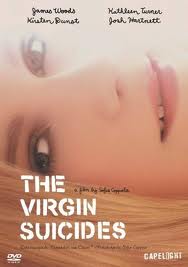
THE VIRGIN SUICIDES
US, 1999, 97 minutes, Colour.
Kirsten Dunst, James Woods, Kathleen Turner, Josh Hartnett, Danny De Vito, Michael Pare, Scott Glenn, Jonathan Tucker.
Directed by Sofia Coppola.
The Lisbon family are Catholics in 1975, so their five daughters’ suicides would have been considered grimly at that time, especially in terms of sin. Scott Glenn plays the parish priest who comes round to the house to offer comfort. The father, James Woods, is watching sport on television so that he will not have to go deeply into his grief. The mother, Kathleen Turner, sits alone in her room, in disbelief. The priest again offers comfort and does tell her that he considered her daughter’s (the first of the suicides) as an accident and so Catholic burial is in order. He speaks to the girls and tells him he is available if they want to talk about anything. Sympathetically functional sequences – no miracles.
Based on a novel by Jeffrey Eugenides, the film dramatizes the lives of the Lisbon daughters, led by Kirsten Dunst. There are various boyfriends in the background, but the screenplay ponders the lives and death wishes of these girls and the follow through in suicide.
It was written and directed by Francis Ford Coppola’s daughter, Sofia, who had appeared in Godfather 3, but whose directing career includes Lost in Translation, Marie Antoinette, with Kirsten Dunst, Somewhere and The Bling Ring
1. A film of 1999, the transition from the 20th to the 21st century? Transition in family life, community, American society, values and morals?
2. The 1975 setting, looking back a quarter of a century to this decade? Re-assessment, the issues, questions?
3. The American town, the American family, home, school, church…? Affluent?
4. Sofia Coppola and her career? Adapting this story? The work of Jeffrey Eugenides? Her own family background and experience? Cinema experience in her family? Her perspectives and interests? A woman identifying with the daughters?
5. The title, the shock value, the possibility of this kind of occurrence in the one family, plausible?
6. The introduction to the town, the echo of films like Blue Velvet and the street, the houses, cruising along the streets? The Lisbons and their home? Audience and ordinary expectations from this introduction?
7. The voice-over, Tim and his perspective, the adolescent, the sexual interest and attraction, involvement? The boys, their curiosity? Tim’s tone of voice? The boys gathering, their discussions, their anecdotes? The boy who boasted of finding Cecilia in the bathroom?
8. Trip, his voice-over, from the older Trip, 25 years perspective, his strong memories, callow memories and callow behaviour? At the end and his being in an institution?
9. The Lisbon family, the strong personality of the parents, ordinary, the father and his easier approach, teaching geometry, the scenes of his classes, explaining planes and wing spans? His wife being stricter, clothes, the cross around her neck? The Catholic background? The young boy’s visit and the impact? The decision about the party, the father and his showing the boys the planes? The awkwardness of the party, the girls and their talk? The Downs boy coming in, dressed for the party, the boys encouraging him, partly ridiculing him? The response of the girls?
10. Cecilia and her wrists, going upstairs, throwing herself out the window, impaling herself? The reaction at the party? The subsequent grief? The visit of Father Moody, the father watching television, detached from reality, talking about the sport?
11. The father at school, detached with the teacher, meeting Trip, Trips request about the dense, Trip coming to the family, to the meal, watching TV and the mother with the TV Guide and supervising the programs? Trip’s request with the daughters present, the wife’s reaction? Yielding? His being the supervisor?
12. The portrait of the mother, a strictness, grace before meals, silent grief, the visit of the priest, his reassuring her that the death would be listed as an accident? Her attitude towards parties, towards dancing, towards girls going in cars, accepting that girls go with the group, buying their dresses, altering them for more modesty? Her burning Lux’s records?
13. Cecilia, slitting her wrists, her being saved, in hospital, going to the psychiatrist, the Rohrshach blots, responses, the psychiatrist saying this was a cry for help? Conscious of her wrists, taking of the bandages, at the party, leaving it, her death?
14. The aftermath, the parents being calm, the visit of the priest, talking with the father, with the mother? Talking with the girls saying that he was available if they wanted to talk? The pulling out of the fence? The neighbours and their observing? The girls and their grief?
15. The five girls, the introduction, their names, ages, descriptions? At home, the meals, at school? The importance of the dance? Lux and Trip as king and queen? The aftermath of Lux’s night out, their being confined, the contact with the boys and the playing of records through the phone? The effect of this confinement?
16. Lux, her name, light? Vivacious? The boy visitor, kissing him? Finding him in the bathroom? Her room? The party, the aftermath? Her cheerfulness with Trip, talking, meeting, driving? The dance, dress, under the table, kissing, the king and queen of the prom? The night in the oval? Trip’s disappearance, getting the taxi home? At home, the restrictions, the rest of the girls, the burning of the records? Hatred towards Trip, sending the message that she hated him? The effect on her self-image?
17. The boys, the boy with the strange walk, falling in love and jumping from his window? the boy who said he found Cecilia? The boy visiting for the meal and the father enthusing about geometry? His going to the bathroom? The group, Tim’s place, narrator, the other boys, the sexy come-ons, the smaller boy and his talk with the sister at the locker?
18. Trip, confident, with Lux, not being able to follow through, the perspective of 25 years?
19. The plan, for the girls to go out, Lux and her initiatives, the boys going to the house, Lux meeting them, the girl hanging in the basement, the response and escape? The sister dying of the overdose, the sister with her head in the oven, Lux and her killing herself in the car in the garage?
20. The television interviewer, the question is, the mother’s reaction? The dispersing of the action with sequences of the commentator on the television, social issue of suicide?
21. The people of the town, the gossiping, they’re watching the television, the reaction, the parents watching with their sons?
22. The aftermath party, the famous of asphyxiation, the Surrealism of the party and the visuals?
23. The aftermath, everybody returning to normal, the Lisbon’s moving?
24. The audiences immersed in the world of the Lisbons, of the sisters, their strict parents, repressing their children, the children needing to burst out, especially Lux, the parents not understanding their children? The disastrous family life?
Published in Movie Reviews
Published in
Movie Reviews
Tagged under
Saturday, 18 September 2021 19:55
Mommy
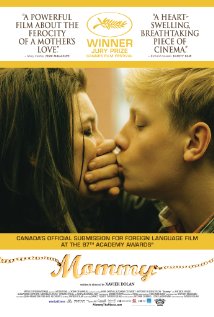
MOMMY
Canada, 2014, 139 minutes, Colour.
Anne Dorval, Antoine- Olivier Pilon, Suzanne Clements.
Directed by Xavier Dolan.
On the day that this review is being written, Xavier Dolan, the precocious French- Canadian director, has a birthday. He turns 26. Mommy is his fifth film, making an impression, building on I Killed My Mother, following with Heartbeats, Laurence Anyway, Tom at the Farm, and now this film which won the jury prize in Cannes, 2014. He himself has appeared in the four earlier films but does not act in this one. The two female members of his cast have appeared in his other films. His main actor this time is a young Canadian, Antoine- Olivier Pilon.
The main actors are most impressive in their roles, Anne Dorval as the mother, trying to cope with her son who is ADHD, and Pilon as the teenage son, Steve. Suzanne Clements is the neighbour who helps both mother and son.
This is quite a long film, two hours and 20 minutes, and, while some of it is repetitious, it holds the attention with its dynamic characterisations, situations, interactions. At the opening, the mother, Diane, called Die, is taking her son out of an institution where he has set the kitchen on fire and caused extensive burns to one of the children. She takes him home, where he has a room, and tries to look after him, controlling his moods, urging him for his education. She herself is not well-educated and regrets this, having a fairly rough personality, quite aggressive physically and verbally in her dealings with many people, especially at institutions, and Steve inheriting some of this aggression – with racist and homophobic slurs.
Across the street is Kyla, a good woman who is having a sabbatical, she explains, from her teaching. She is at home with her husband and daughter, but has acquired a nervous impediment which makes her stammer. She makes friends with Die who asks her to mind Steve for a day – with some initial dire consequences, but Kyla is able to calm him somewhat and use her skills as a teacher to interest him in subjects which he follows through and responds so. In the meantime, Die tries to get a job as a translator of children’s books and takes on cleaning jobs as well.
Quite a lot of the film is a portrait of Die trying to cope with her son, his losing his temper, his reactions towards her, confiding in Kylie and getting some help. In the meantime, Steve is entirely unpredictable.
The film opens with some information about Canadian legislation, especially in French- Canada, where parents can take unruly children to institutions of care. This is the dilemma for Die, whether she can keep Steve at home as he grows older and more challenging or whether she should place Steve in an institution.
There is some pathos at the end with Die, after an outing to the beach with Kylie and Steve, having to make a decision and the audience sees how it affects her, Kylie moving to Toronto which is sad for Die, and Steve and his way of dealing with his mother’s decision.
Xavier Dolan is quite the director. He also writes, edits, designs costumes and writes the subtitles both in English and in French, a lot of it quite slangy given the background of the characters.
So, what will Dolan be doing in five years, 10 years, 15 years, with his life and career before him…!
1. A contemporary story of mother and son, difficulties, clash, ability and inability to cope?
2. The director, aged 25 when he wrote and directed this film? His career, insights, portraits of Canadian characters, situations and crises?
3. Montréal, the suburbs, homes and streets, the beach? Shops, supermarkets? Institutions? The musical score, the use of songs for each of the characters?
4. The title, Die’s necklace? Its tone? Die and her name? The background of the marriage, her husband’s work, his death, the effect on Steve, his being diagnosed with ADHD, his age, the teenager, school, institutions, his relationship with his mother?
5. The institution, Steve’s behaviour, being reported, Die and her interview with the authority, the fire in the kitchen, the effect on the burnt boy? The later summons and potential court case? Steve’s age, the difficulties, unlikeable, but his potential? Afflicted with his diagnosis, his abrupt and spontaneous action and language?
6. Die and her age, little education, regretting it, considered trash? Her language and behaviour? Slang? Memories of her husband, the marriage, his work? Taking Steve from the institution, bring him to the new home, his room – and its later disorganisation? Cooking, the meals, his participating? Smoking?
7. Kyla in the opposite house, each waiting to the other? Her situation, her husband, daughter, her sabbatical from teaching, her speech impediment? Trying to cope? The contact with Die, the visit, the conversations, serving as a sounding board? Coming to the meal, Steve’s behaviour, her managing? Die asking Kyla for a favour, to mind Steve during the day? The clashes, his wetting himself, Kyla’s reaction? His apologies? The books, his interest in learning, Kyla and her ability to teach, his response, his work? The potential for both Steve and for Kyla?
8. Die, wanting to do the translation work, visit to the editor, her posing as carefree? To the bank, the cash? The work and the cleaning jobs?
9. Paul, his interest, attracted to Die, lawyer, her resistance, spilling the groceries on the road and his helping? Die in need of him for legal help? Going out, the attraction, the drinking? Steve and the karaoke, getting upset that people were not listening, especially Paul and Die? His attack, the fight, being ousted?
10. Steve, his attitudes, the racist outburst against the taxi driver? His insulting people, homophobic language? Abusive? The contrast with when he was quiet? The effect of being with Kyla? With his mother? Going to the beach? Uncontrollable, his mother taking back to the institution?
11. Die in herself, her limits, her potential, the talk, her moods, ups and downs in behaviour, interactions with people? The issue of how much Steve was imitating his mother and her moods and behaviour?
12. The laws about the institution, the explanations at the beginning of the film? Parents unable to cope with difficult children? Die’s decision, immediately changing her mind, the staff at the institution, the fight with Steve, the taser? Her having to calm down?
13. The weeks passing, Die and her being calmer, in the kitchen, the house, Kyae coming to visit, the news of going to Toronto, Die’s being upset?
14. Steve, the phone call, and the straitjacket, saying all the right things and checking them out, his mother’s response? The restraints, the medication – and the issue of whether he would be able to cope?
Published in Movie Reviews
Published in
Movie Reviews
Tagged under
Saturday, 18 September 2021 19:55
Dark Horse, The/ New Zealand
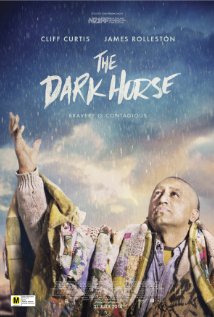
THE DARK HORSE
New Zealand, 2014, 110 minutes, Colour.
Cliff Curtis, James Rolleston, Kirk Torrance, James Napier Robertson.
Directed by James Napier Robertson.
The Dark Horse is an impressive film from New Zealand. It stars Cliff Curtis as Genesis Potino, who is seen initially talking to himself in the rain, attracted to a shop, to the chess board. He has suffered from mental disturbance throughout his life, with flashbacks to his early childhood and his friendships, his being taken to an institution.
The film details his life in the institution and his need for medication, it also shows him in Gisborne and his interest in chess.
The film spends some time in establishing the chess setting, the playing of the game. But it also shows Genesis and his interaction with young people, the response to chess, hostile at first, practising, becoming champions, going to New Zealand championship performances. Genesis tries hard to contain himself while his youngsters play – and there is quite some emotional excitement as we watch the various matches, the losses and the final victory.
The film is a tribute to Genesis Potiino and a reminder that so many people have extraordinary talents inside them but need encouragement and opportunities for those talents to bear fruit.
20 years earlier Cliff Curtis appeared in a villainous role in Once Were Warriors. His career continued in New Zealand with such films as The Whale Rider but he also had a substantial international career.
1. The title? Reference to Genesis Potino, his chess career? His support of the Eastern Knights?
2. New Zealand settings, New Zealand story? Gisborne, the town, the streets, homes, the hut for playing chess, the monument? The sea setting? Auckland, the chess tournament? The musical score?
3. The focus on chess, the attraction, chess in itself, the needed skills, the moves, the players taking notes? The tournaments, rivalries and competitiveness? The possibilities for redemption?
4. Genesis’ story, the flashbacks to the two little boys, their later history? Genesis in the rain, talking to himself, his psychological state, attracted to the shop, to the chess board? His being persuaded and taken to the institution? Life there? The importance of his medication? His contacting his friend, being released, staying in the house, the friend and his reluctance, yet the bonds of the past? Putting Genesis in his son’s room? The son and his reaction? 4.30 in the morning, waking up his friend, talking, the possibilities for playing chess? Help young people? The need for stability? The meeting with the young people, the introduction, the bonding, each getting a personal chess piece, the cross-section of young people and Genesis’ interactions with them, boys and girls, parents, the supervisor? Genesis teaching the young people and their picking up the chess moves quickly?
5. Genesis in himself, his talking, the pills, the hallucination of blood in the mirror, his ambitions and achievement in chess, interactions with Mana, the news of his father dying, wanting to go to the tournament, Mana not willing, yet going?
6. Going to Auckland, the range of games, Genesis’ shouting and unable to contain himself, his being rebuked? The young people playing, the many losses and reactions, shaking hands, angry outbursts? Man and playing, losing? Michael, his skills, nerves, Genesis being ousted, the atmosphere? And Eastern Knights with the yellow T-shirts?
7. Genesis outside, Michael winning, joy for the gourp? Mana’s further arriving, the clash, taking his son? The group’s return?
8. Genesis coming to the party, Mana, his being bashed, his injured eye, his father’s brutality, yet his is being terminally ill? The arrival of the elder, confronting the father, the father letting his son go?
9. Genesis, driving into the future?
10. The final credits, the details about Genesis’ life, the years of helping young people, his achievement despite his bipolar condition? His death in 2009? Fine tribute and performance by Curtis?.
Published in Movie Reviews
Published in
Movie Reviews
Tagged under
Saturday, 18 September 2021 19:55
Minister, The/ L'exercice de l'etat
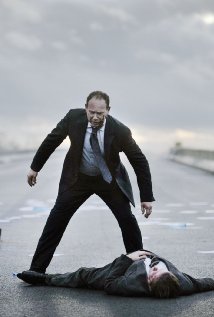
THE MINISTER/ L’EXERCICE DE L’ETAT
France, 2011, 115 minutes, Colour.
Olivier Gourmet, Michelle Blanc, Zabou Breitman.
Directed by Pierre Schoeller.
This is an interesting film about French politics, with a challenge to audiences to think about their own countries and situations, the cut and thrust of politics, the pressures, the personalities of the politicians.
Olivier Gourmet, star of many of the films by the Dardennes Brothers, is a politician who wakes with the news that there has been a car accident. This accident is later visualised with quite some force. He goes to the site, and then has to face all kinds of questions about his portfolio, about his promotions, about his being sidelined, about the issues of road safety, and the complaints by the unions.
The French title is the States action, which also has underlying themes of intrigue and cutthroat ambitions.
1. A film about politics, interplay, intrigue, cut-throat ambition?
2. French politics, universal aspects?
3. The focus on Bertrand, waking up, his wife, the news about the accident, his going to the scene, his press adviser, his staff, the planning of the speech, giving his speech? The concern about the dead, the lifting of the bus, his looking at the bodies, his reaction? The return to Paris, the discussions with Gilles, policies and attitudes, the higher authorities, his responsibility?
4. Gilles, the 20 years as assistant, the phone calls, his advice?
5. Bertrand as Minister, his responsibilities, transport? His link with Gilles, with the President?
6. Meetings, discussions, policies, applications? The role of advisers, the decisions by the Minister? The repercussions? The press and the press adviser?
7. Ministerial rivalries, personal dislikes, plans, manoeuvres, the press, the President? The role of the railway stations, road developments?
8. Bertrand, his being willing to sack Pauline, her continued advice? The status of Gilles? Taking the side road, unfinished, the crash, the death of the driver whom he had interviewed?
9. Hospital, treatment, the meetings, the visit of his wife, a moment for self-reflection and personal dislike of himself?
10. Out of hospital, new situations, the jealous Minister, the possibility of retirement, getting some kind of benefice? Further collaboration with Gilles, promising that he would be there always? Accepting Pauline? The discussions with the other ministers, the press conferences, the change of job, the other Minister and his sense of betrayal and anger? Discussions with the President?
11. Bertrand, his future, the sacking of Gilles and Gilles walking away…? End of an era, beginning of a new era for Bertrand?
12. A portrait of politicians – created for this kind of drama? Reflecting reality?
Published in Movie Reviews
Published in
Movie Reviews
Tagged under
Saturday, 18 September 2021 19:55
Cliffy
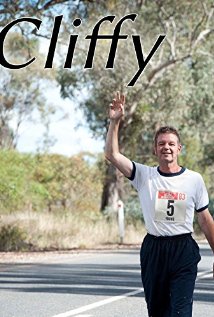
CLIFFY
Australia, 2013, 92 minutes, Colour.
Kevin Harrington, Roy Billing, Krew Boylan, Martin Sacks, Anne Tenney, Joan Sydney, Gyton Grantley, Stephen Curry, Denise Roberts.
Directed by Dean Murphy.
For audiences who remember Cliff Young, the farmer who won the marathon run from Sydney to Melbourne in 1983 (in the spirit of Australia winning the America’s Cup and Prime Minister Bob Hawke’s enthusiasm for both), this is an engaging re-creation of the event as well as giving background to Cliff Young as a person, as a farmer, his family, his ability to run, his being coached for the event.
Kevin Harrington is believable as Cliff Young, seen working on his farm, his relationship with his family, living with his mother and supporting her despite her moods in criticising him. At times he will run from his farm down to Apollo Bay and back, with a characteristic shuffle the people laughed at, criticised, but eventually came to recognise and admire – with information that many runners have adopted this shuffle for their own running engagements. Roy Billing, always an entertaining presence, appears as his old coach, Wally.
Given the difficulties on the farm, and Cliff’s admiring of such runners as Tony Rafferty, it seems a good idea to him, not always to his family, that he should enrol for the race. The promoter, Gyton Grantley, is rather mocking but has to change his tune as the race goes on, Cliff continuing to shuffle, despite the injuries to his feet, but with the support of the family following in a car car and caravan.
Gradually, the media make something of a hero of the man that they had initially mocked and cover his running for the whole race, his arrival in Melbourne in the early hours of the morning.
Cliff is encouraged by the young woman that he meets and runs with, phoning her during the race, listening to advice – and then, ultimately marrying her, even though the marriage did not last.
An entertaining piece of Australiana.
1. An Australian story? Characters? Situations? Spirit?
2. The true story, 1983, Cliff himself, his family, age, farm work, running, and admiring runners, selecting Wally as his coach, the decision to run? The difficulties, his being accepted? The man and his achievement?
3. Re-creation of the period, the 1980s, 1983, the background of the America’s Cup, the television clip from Bob Hawke? Look the times? The musical score, songs?
4. Victoria, Colac, the farms, the coast, the crops, the potatoes? Cliffy living with his mother, her age and care for her? Sid, his family, support? The family meals, the discussions, the participation of the family in backing up Cliffy, their shared achievement despite the difficulties?
5. Cliff and his shuffle, aged 61, 70 kilometre runs to the coast, his running in the paddocks? Meeting Mary, her sharing in his runs? His attraction to her?
6. Cliff is a person, single, waiting for the right girl, the attraction to Mary, falling in love? His phone Call to her during the race? Her recommending music? Her support and that inspiring him? The scenes of the wedding, the five years together, amicable parting?
7. Wally, growing up with Cliff, the clashes, Cliff not going to Wally’s wife’s funeral? The visit, slamming the door? Wally being persuaded? His limited background with footballers? Coaching Cliffy, the exercises, the runs, timing him? Getting ready for the race?
8. The response of the family? Wary? His mother and her concern? Sid and his encouragement? Sid’s wife and her going with Paul, the caravan, the car, the backup?
9. Going to Sydney, the attempt to register, the manager and his not wanting his not wanting to be laughed at? Cliffy going back, the persuasion? The social, meeting people?
10. The background of Tony Rafferty, his marathon runs, expectations, the other celebrities of the time? Their participation in the race? Overtaking Rafferty? Rafferty and his comments about his initial impression, tribute to Cliff?
11. The details of the run, the shuffle, slow going, awkward at the start? Gaining momentum, staying overnight, getting up early, the runs, gradually overtaking people?
12. The television coverage, more and more people interested, lining the way, cheering him on?
13. The progress of the race, sares, his feet, superglue? The manager and his change of mind? Cliff becoming something of a national hero?
14. Almost giving up, Wally’s encouragement, the family? The phone Call to Mary? Continuing to Melbourne, arriving at 2.30 in the morning, people cheering, the media?
15. The achievement, the receptions, television interviews, his basic responses, the touch of the naive?
16. An underdog story, in the Australian spirit, perseverance, Australians’ love of sport and cheering him on?
Published in Movie Reviews
Published in
Movie Reviews
Tagged under
Saturday, 18 September 2021 19:55
Albuquerque
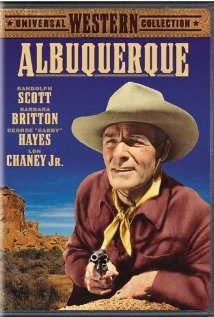
ALBUQUERQUE
US, 1948, 90 minutes,
Randolph Scott, Barbara Britton, George Gabby Hayes, George Cleveland, Lon Chaney Jr, Russell Simpson, Irving Bacon.
Directed by Ray Enright.
Albuquerque is one of Randolph Scott’s many westerns, making westerns solely from the mid-1940s to 1962. This one is directed by Ray Enright also directed Trail Street and Coroner Creek at this time.
Randolph Scott rides into town hoping for a job with his uncle in freight hauling, teaming up with a group of honest people who are being put out of business by Scots uncle, George Cleveland as an avaricious villain. Scott confronts his uncle, teams are with the honourable types which leads to Western action and gunfights. Lon Chaney Jr is a graph film, George Gabby Hayes is enjoyable in a less than typical role.
This is quite a routine western.
1. A Randolph Scott Western? Plot, type, a heroics?
2. The Western tradition in 1948? Conventions?
3. New Mexico, the city of Albuquerque, offices, the mines, companies? The jail? Action, the hold-up, the 12 mule carriage? Musical score?
4. The presence of George Gabby Hayes, his appearance, jokes, way with words, old-timer? Teaming up with Cole, with the mules, the final confrontation and shootout?
5. The pioneers in New Mexico, coming from the east, from Texas? The Hispanics and their fiestas, religious services?
6. The initial hold-up, the shooting, the robbing of the money? The role of the sheriff, John Armin, the men going to the saloon, Juke and Cole finding them, the confrontation, the killer going to jail? Armin and his seeming to agree, arranging for the sheriff to kill him?
7. Cole, the stagecoach, the friendship with Celia, Myrtle and her prattle? The deaths? The robbery?
8. Cole, nephew of Armin, the bad reputation, Ted and his reaction? Cole wanting a job from his uncle? Going to see him? The discovery of the truth about him?
9. Armin’s henchman, killer, confronting Cole, their fight, cowardice, his death?
Cole, retrieving the $10,000, his hold over his uncle? Ted and his animosity, change of heart? Cole investing in the company? The success? Letty, her arrival, called in by Armin, helping with the work, falling in love with Ted? Celia and her love for Cole?
10. Sabotage, Ted being shot in the leg? His love for Letty, disillusionment?
The fire, Cole accused, going to court, the testimony against him, Myrtle and her witness to his being with Letty? Celia upset? His being in jail, Myrtle’s visit? Going on the Stagecoach or not?
11. The explosion in the mines? Cole and his discussions with the managers, with Huggins? The contract for 12 mule carriages? The dangers?
12. The trip down the mountain, the lack of a brake? Cole managing? Arrival in town, Armin calling in the gang? Letty and her confrontation with Armin?
13. The shootout, the men undercover in the wagon? Armin’s death?
14. Prosperity to the company, and happy weddings?
Published in Movie Reviews
Published in
Movie Reviews
Tagged under
Saturday, 18 September 2021 19:55
Beautiful & Twisted
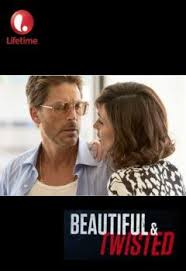
BEAUTIFUL & TWISTED
US, 2015, 90 minutes, Colour.
Rob Lowe, Paz Vega, Candice Bergen, Seychelle Gabriel, Jude Ciccolella, Michelle Hurd.
Directed by Chris Zalla.
This film is allegedly based on a true story, the murder of millionaire Ben Novack by his Hispanic wife.
The film opens with a narrative from the murdered Ben Novack, going back over his life and experience with his wife, commenting favourably on her but then less and less favourably as she becomes more violent. There is an initial scene where she goes to the bank, transfers money from husband’s private box but is stopped because she is not a signatory to the documents. Then, flashbacks.
Paz Vega portrays a mother of a young girl, a stripper and lap dancer in a club – a touch prurient in the portrayal of performances in the club. She attracts the attention of Ben Novack who explains that he was brought up in the context of the Fontainebleau Hotel in Florida, his parents more skilled at socialising than parenting, his learning facts of life, sex and drugs in the back rooms of the hotel, and now frequenting strip clubs. He makes approaches to Narci but is rejected until he saves her from an attempted rape.
When he takes her to see his mother, Candice Bergen in a flamboyant performance, she is dismissive but is attracted to May, Narci’s daughter. May grows up up to be a well-educated and sensible young woman, able to manage her father’s business affairs. He, meanwhile, does take up with more strippers much to the anger of his wife. She becomes more vengeful, eventually hiring killers to murder her husband’s mother, then hiring them to murder him – and a final attempt on the daughter.
Rob Lowe, executive producer for the film, has performed in a number of television film similar to this one and seems to wander through the film as Ben Novack with comparative ease, always coming back to his wife, infatuated with her and loving her. Paz Vega seems to relish the opportunity to play this kind of bad girl, pulling all the stops out in her luxurious lifestyle after the death of her husband. Seychelle Gabriel as May is a beacon of common sense.
The film shows the Miami police interested in the case but accepting accidental death in the case of the mother, accepting the wife’s testimony at first glance, but then pursuing the details of the investigation.
In fact, this is the story of people who appear in gossip columns, flashy and wealthy, sleazy and violent – and not really worth the attention of a television film, no matter how titillating the story.
Published in Movie Reviews
Published in
Movie Reviews
Tagged under
Saturday, 18 September 2021 19:55
My Summer of Love
MY SUMMER OF LOVE
UK, 2004, 86 minutes, Colour.
Natalie Press, Emily Blunt, Paddy Considine.
Directed by Pawel Pawlowski.
Pawel Pawlowski is a Polish director who achieved international fame by winning the Oscar for Best Foreign Language film for 2014, Ida. While he worked in his native Poland, he also made several films in the United Kingdom, especially a film about migrants which achieved acclaim, The Last Resort, and this drama about a friendship between two teenagers in the provinces.
The drama is often quite intense, the relationship between the two girls, the touch girl from the pub with her bike that has no motor, Mona, Natalie Press, and the more sophisticated boarding school student, Tamsin, introducing Emily Blunt. While Natalie Press has had a career in Britain, Emily Blunt went on to be an international star, making her mark in The Devil Wears Prada, and winning nominations for her role in Into The Woods.
The film captures the atmosphere of place, with views of the hills, the town, the suburbs, the mansion. In the pub, Mona’s brother is emptying out the alcohol – after a termin prison, where he was born again, he wants to turn the pub into a prayer centre, even raising a huge cross to mark the place. However, he goes through a process of emotional upheaval, with his sister, but, especially, the malevolent behaviour of Tamsin. He is played by Paddy Considine.
The relationship between the two girls is intense, Mona shrewd but somewhat naive and not recognising the manipulative behaviour of Tamsin (who may or may not realise her manipulation herself), her lies about her sister, her attitude towards her father. But she also wants to introduce Mona to culture including classical music and the reading of Nietzsche.
An interesting drama highlighting the emotional relationship as well the hold of each girl on the other.
1. British story? Polish director and perspective?
2. Yorkshire, Lancashire, the countryside, the hills, vistas, the town, the pub, becoming a Revival Centre, wealth and the mansion? The musical score? The use of classics? The focus on Mona, her explaining her name and complaints? Showing her skill in drawing? A portrait of Mona, her age, experience, the relationship with her brother, his criminal past, the clashes, his taking over the pub, emptying the alcohol, wanting a Revival Centre? The family background? Her affair with the married man and his breaking off? The later visit to his house and challenging his wife? Riding a bike, no engine? Her meeting Tamsin, on horseback? The talk, the bond between the two, Tamsin and accompanying Mona? The number of visits? Tamsin and her school, the background, culture, playing the music, quoting the literature, quoting Nietsche? Sharing, affection, love, the sexual attraction? Tamsin and her stories, about her sister, Sadie, about her father, sitting outside the house when he was with his mistress? Mona talking about her brother, the Centre, Pentecostal prayer? Her observing? Not joining in? The occasion of the raising of the cross? The development of the friendship, the visits? The plan to leave? Mona going to the house, Tamsin and her agreeing to go back to school, her father, the mother and packing, discovering that Sadie had not died of anorexia?
3. Tamsin, the contrast, wealth, school, her age, experience, provocative, meeting Mona, bonding with her, the visits, playing the cello, quoting the literature, Nietszche, her father, the death of her sister? In the countryside, the idyllic summer love, the sexual attraction? The raising of the cross? Talking with Mona’s brother, the attraction, his visit to the house, the seductive manner and mocking him?
4. The brother, the background of his being involved in armed robbery, his time in prison, born-again, pouring out the alcohol, wanting the revival Centre, the people coming to the pub, the Pentecostal prayer, talking in tongues, the raising of the cross? The clashes with Mona? Talking with Tamsin, the seduction experience and his reaction, closing the centre, the threat to his faith?
5. Mona, the final visit, seeing the family, seeing Sadie, the disillusionment, Tamsin and coming and explaining the situation, Mona choking her, the gift of the portrait?
6. The experience of the summer of love, love, hurt, disillusionment, what future?
UK, 2004, 86 minutes, Colour.
Natalie Press, Emily Blunt, Paddy Considine.
Directed by Pawel Pawlowski.
Pawel Pawlowski is a Polish director who achieved international fame by winning the Oscar for Best Foreign Language film for 2014, Ida. While he worked in his native Poland, he also made several films in the United Kingdom, especially a film about migrants which achieved acclaim, The Last Resort, and this drama about a friendship between two teenagers in the provinces.
The drama is often quite intense, the relationship between the two girls, the touch girl from the pub with her bike that has no motor, Mona, Natalie Press, and the more sophisticated boarding school student, Tamsin, introducing Emily Blunt. While Natalie Press has had a career in Britain, Emily Blunt went on to be an international star, making her mark in The Devil Wears Prada, and winning nominations for her role in Into The Woods.
The film captures the atmosphere of place, with views of the hills, the town, the suburbs, the mansion. In the pub, Mona’s brother is emptying out the alcohol – after a termin prison, where he was born again, he wants to turn the pub into a prayer centre, even raising a huge cross to mark the place. However, he goes through a process of emotional upheaval, with his sister, but, especially, the malevolent behaviour of Tamsin. He is played by Paddy Considine.
The relationship between the two girls is intense, Mona shrewd but somewhat naive and not recognising the manipulative behaviour of Tamsin (who may or may not realise her manipulation herself), her lies about her sister, her attitude towards her father. But she also wants to introduce Mona to culture including classical music and the reading of Nietzsche.
An interesting drama highlighting the emotional relationship as well the hold of each girl on the other.
1. British story? Polish director and perspective?
2. Yorkshire, Lancashire, the countryside, the hills, vistas, the town, the pub, becoming a Revival Centre, wealth and the mansion? The musical score? The use of classics? The focus on Mona, her explaining her name and complaints? Showing her skill in drawing? A portrait of Mona, her age, experience, the relationship with her brother, his criminal past, the clashes, his taking over the pub, emptying the alcohol, wanting a Revival Centre? The family background? Her affair with the married man and his breaking off? The later visit to his house and challenging his wife? Riding a bike, no engine? Her meeting Tamsin, on horseback? The talk, the bond between the two, Tamsin and accompanying Mona? The number of visits? Tamsin and her school, the background, culture, playing the music, quoting the literature, quoting Nietsche? Sharing, affection, love, the sexual attraction? Tamsin and her stories, about her sister, Sadie, about her father, sitting outside the house when he was with his mistress? Mona talking about her brother, the Centre, Pentecostal prayer? Her observing? Not joining in? The occasion of the raising of the cross? The development of the friendship, the visits? The plan to leave? Mona going to the house, Tamsin and her agreeing to go back to school, her father, the mother and packing, discovering that Sadie had not died of anorexia?
3. Tamsin, the contrast, wealth, school, her age, experience, provocative, meeting Mona, bonding with her, the visits, playing the cello, quoting the literature, Nietszche, her father, the death of her sister? In the countryside, the idyllic summer love, the sexual attraction? The raising of the cross? Talking with Mona’s brother, the attraction, his visit to the house, the seductive manner and mocking him?
4. The brother, the background of his being involved in armed robbery, his time in prison, born-again, pouring out the alcohol, wanting the revival Centre, the people coming to the pub, the Pentecostal prayer, talking in tongues, the raising of the cross? The clashes with Mona? Talking with Tamsin, the seduction experience and his reaction, closing the centre, the threat to his faith?
5. Mona, the final visit, seeing the family, seeing Sadie, the disillusionment, Tamsin and coming and explaining the situation, Mona choking her, the gift of the portrait?
6. The experience of the summer of love, love, hurt, disillusionment, what future?
Published in Movie Reviews
Published in
Movie Reviews
Tagged under